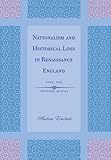Nationalism and Historical Loss in Renaissance England : Foxe, Dee, Spenser, Milton / Andrew Escobedo.
Material type: TextPublisher: Ithaca, NY : Cornell University Press, [2018]Copyright date: ©2004Description: 1 online resource (280 p.) : 1 halftoneContent type:
TextPublisher: Ithaca, NY : Cornell University Press, [2018]Copyright date: ©2004Description: 1 online resource (280 p.) : 1 halftoneContent type: - 9781501723964
- English literature -- History and criticism -- Early modern, 1500-1700
- Literature and history -- History -- England
- Nationalism and literature -- History -- 16th century -- England
- Nationalism and literature -- History -- 17th century -- England
- Literary Studies
- Medieval & Renaissance Studies
- LITERARY CRITICISM / European / English, Irish, Scottish, Welsh
- 820.9358
- PR428.N37
- online - DeGruyter
| Item type | Current library | Call number | URL | Status | Notes | Barcode | |
|---|---|---|---|---|---|---|---|
 eBook
eBook
|
Biblioteca "Angelicum" Pont. Univ. S.Tommaso d'Aquino Nuvola online | online - DeGruyter (Browse shelf(Opens below)) | Online access | Not for loan (Accesso limitato) | Accesso per gli utenti autorizzati / Access for authorized users | (dgr)9781501723964 |
Browsing Biblioteca "Angelicum" Pont. Univ. S.Tommaso d'Aquino shelves, Shelving location: Nuvola online Close shelf browser (Hides shelf browser)

|

|

|

|

|

|

|
||
| online - DeGruyter Self and Story in Russian History / | online - DeGruyter Clinical Psychiatry in Imperial Germany : A History of Psychiatric Practice / | online - DeGruyter Gendering the Master Narrative : Women and Power in the Middle Ages / | online - DeGruyter Nationalism and Historical Loss in Renaissance England : Foxe, Dee, Spenser, Milton / | online - DeGruyter Ethnic Politics / | online - DeGruyter Government Works : Why Americans Need the Feds / | online - DeGruyter Athenian Political Thought and the Reconstitution of American Democracy / |
Frontmatter -- CONTENTS -- PREFACE -- INTRODUCTION: The Nation in Time -- 1. TRAITOROUS MARTYRS, OR A HISTORY TO FORGET? -- 2. ANTIQUARIAN HISTORY -- 3. APOCALYPTIC HISTORY AND ENGLISH DEFERRALS -- 4. POETICAL HISTORY -- 5. FROM TRADITION TO INNOVATION -- CONCLUSION -- INDEX OF NAMES -- INDEX OF SUBJECTS
restricted access online access with authorization star
http://purl.org/coar/access_right/c_16ec
Andrew Escobedo here seeks to provide a new understanding of the emergence of national consciousness in England, showing that many Renaissance writers articulated their Englishness temporally, through an engagement with a history they perceived as lost or alienated. According to Escobedo, the English experienced nationalism as a form of community that disrupted earlier religious and social identities, making it difficult to link the national present to the medieval past. Furthermore, he argues, the English faced the nation's temporal isolation before the Enlightenment narrative of historical progress emerged as a means to interpret novelty in a positive light.Escobedo examines how John Foxe, John Dee, Edmund Spenser, and John Milton used narrative representations of nationhood to mediate what they perceived as a troubling breach in history, attempting to bring together the English past, present, and near future in a complete and continuous story. Yet all four authors also register their concern that historical loss may be an inevitable feature of a "modern" England, and they come to see their narratives as long tapestries that spontaneously rip apart as they grow, obliging the weaver to return to repair them. Focusing on Renaissance England's perplexing sense of its time-boundedness, Escobedo presents early national consciousness as stranded awkwardly between the premodern and modern.
Mode of access: Internet via World Wide Web.
In English.
Description based on online resource; title from PDF title page (publisher's Web site, viewed 26. Apr 2024)


